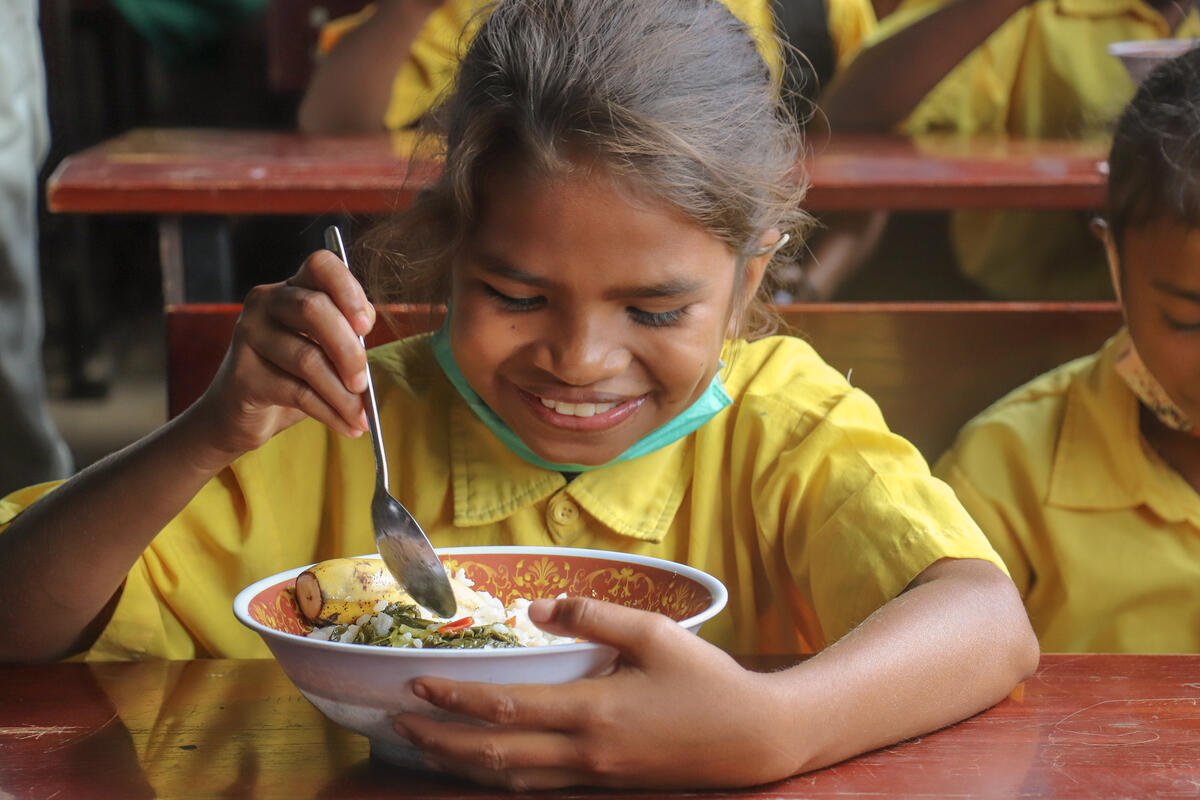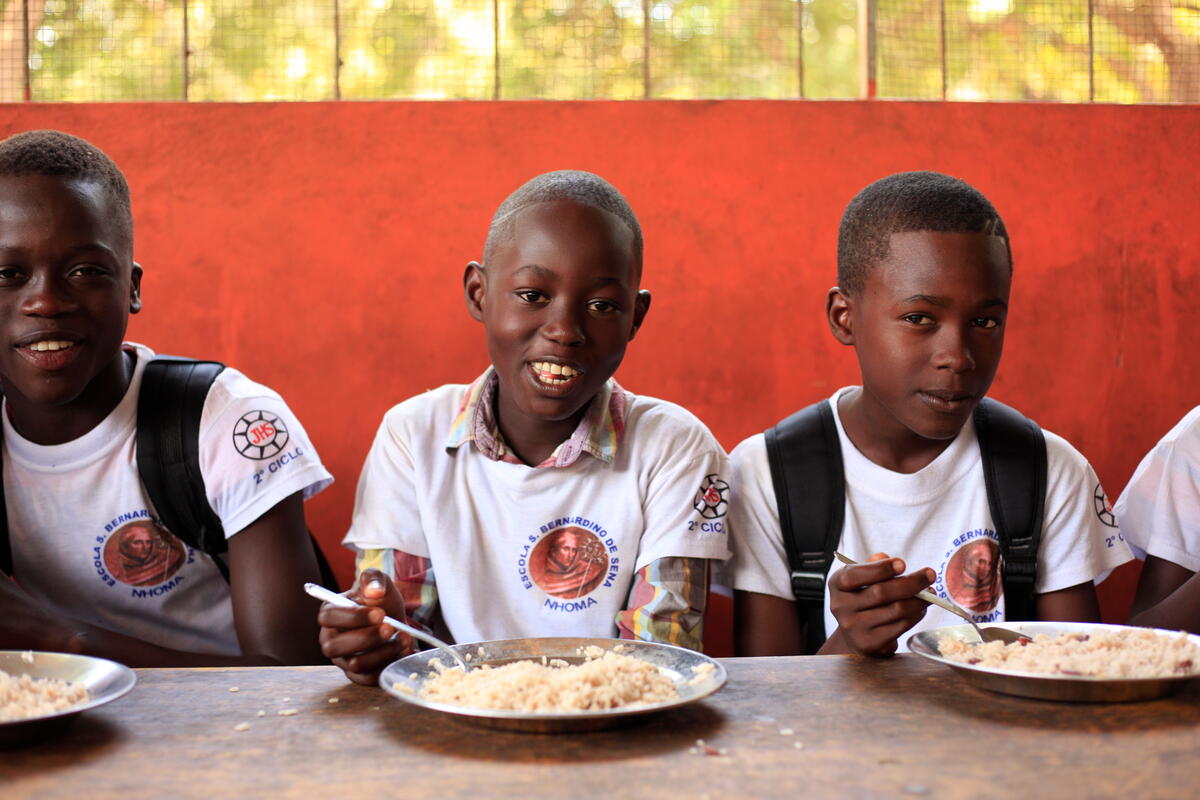
Representatives from governments of Portuguese-speaking countries met last Tuesday, June 20, to assess best practices and share examples of national initiatives for monitoring and evaluating school feeding programmes. The webinar presented and organised by the World Food Programme (WFP) Centre of Excellence against Hunger Brazil, in partnership with the Brazilian Cooperation Agency (ABC, in Portuguese) and the National Fund for Education Development (FNDE, in Portuguese), brought together experts and technicians from Angola, Brazil, Cape Verde, Guinea Bissau, Mozambique, Sao Tome and Principe and East Timor.
In his opening speech, Daniel Balaban, Director of the Centre of Excellence, stressed that sustainable school meals programmes depend on monitoring and evaluation. “We know that monitoring and evaluating school meals programmes is essential, necessary for governments to obtain reliable and verifiable data on the true state of school meals. Also, so that they can analyse the real impact of these programmes, correct failures, develop new interventions and better inform the various stakeholders,” he stressed.
Following that, Renata Mainenti Gomes, coordinator of support for social control of the General Coordination of the National School Meals Programme of the FNDE, brought examples of the Brazilian experience, such as school meals councils, computerised systems for monitoring the National School Meals Programme (PNAE, in Portuguese) and strategic partnerships with the Collaborating Centres for School Food and Nutrition (CECANEs, in Portuguese). She also pointed out the challenges of monitoring and evaluating the programme in a country of continental dimensions and with different local dynamics.
The director of the National Programme for School Meals and Health (PNASE, in Portuguese) of Cape Verde, Henrique Fernandes, also pointed out challenges, such as the need to update the instruments for collecting, processing, and analysing data. In addition, he stressed that the existence of legislation is fundamental to ensure the guarantee and the continuity of monitoring actions, bringing examples from PNASE, such as the results indicators and their means of verification.

Representing Guinea Bissau, Julio Cesar Nunes Correia, Director of School Canteens at the Ministry of Education, presented the partners involved, the different levels of articulation of the management, monitoring and evaluation process, the relevance of focal points, as well as the systems used in the School Canteen programme. Among the challenges identified, he pointed out the need to create a database that includes essential data from the programme.
On the Mozambican experience, Manuel Fulede, from the Department of Nutrition and School Meals of the Ministry of Education, commented on the country’s school meals strategy, which will serve as a basis for the development of legislation on the subject. According to him, monitoring and evaluation actions are being developed, but present some challenges, notably the improvement of monitoring tools.
Youdmila Vila Nova, nutritionist of the National School Meals and Health Programme (PNASE, in Portuguese) of Sao Tome and Principe showed how monitoring and evaluation actions are carried out in the country, such as the monitoring and evaluation forms, which serve as a basis for data collection and are used in periodic visits to schools. She also presented challenges such as the need for improvements in the programme’s funding, the adoption of a law regulating the purchase of local products and improvements in school kitchens and canteens.
Finally, Joaquim Martins, national director of school social action and health issues of the Ministry of Education, Youth and Sports of East Timor, explained how the School Meals Programme works and the types of data that are collected, prepared and consolidated by the school meals management team. He added that the monitoring and evaluation system needs improvements, for example, with the use of standardised data collection tools and professional training activities.
João Lima, responsible for monitoring and evaluation actions of the WFP country office in Mozambique, made a summary of the issues addressed at the meeting, bringing key points that school meals managers should think about for the development of sustainable monitoring and evaluation systems: legal basis, funding predictability, focal points at subnational level and standardization and reliability of data were some of the issues addressed. Plinio de Assis Pereira Junior, substitute responsible for the area of trilateral south-south cooperation with international organisations at the ABC, closed the meeting highlighting the importance of exchanging knowledge between partners and creating constructive spaces for dialogue.
This was the third online meeting with Portuguese-speaking countries, following the success of the last two meetings, on nutrition and school meals linked to local agriculture, both held in 2022. It also reflects the recommendations of the II Seminar of Good Practices on School Feeding in the Community of Portuguese Language Countries (CPLP, in Portuguese), held in Luanda, Angola, in February 2023, the group’s Food and Nutrition Security Strategy (ESAN-CPLP) and the materialization of the Multilateral Cooperation Plan in Education.




